
Sense's Reminiscences
by Sense de Jong
- Geurt
- Tante Betje (by Sense)
- Tante Betje (by Truus)
- Miss Roozendaal
- Concert in Winschoten
- A baptism remembered
- My birdhouse
- War veterans
- Henk Smit - bass/baritone
- Stefan
- In memory of Herman - I
- In memory of Herman -II
- Remembering AK
- Our love for music
- Herman - Promoter of Christian Causes
- A Salem evening with Herman de Jong
- From Elsinore to Monschau
- A Danish Treat
- Glimpses of Thuringia and Saxony
- Domie and Hansie
- La Manche, Newfoundland
- Bermuda - Isle in the Sun
- 1932 and 1934
- 1940 - 1945
- Winschoten, Grace on the Venne
- 1948
- Johann Sebastian Bach
- From Generation to Generation
- Seven children and a harmonium
- K.P. - A Man of Enterprise
- Cuba and the tragedy of the MS St Louis
- It all began in Norwich, Ontario
Another site by Sense de Jong:
~ Hinne de Jong ~
A Chronicle
Sites by Henry de Jong:
~ Herman de Jong ~
Memorial
~ Newmaker Notes~
Writings, Pictures, Collections
~ AACS/ICS Niagara Conferences~
1970 - 1991
(Foreword - It has always puzzled me why my wife's middle-aged father, K.P. Smit, his wife and four grown-up children left the Netherlands in the early 1950s to immigrate to far-away Canada, leaving behind a rather successful clothing store in the village of Surhuisterveen, Friesland. But then again, they were riding the waves of a growing uneasiness in Holland and beyond about the economic and political situation in Europe after WWII. Like hundreds and thousands of other Europeans they sold everything lock, stock and barrel and left. The Smits made this a matter of prayer, trusting that the Lord would show the way. And so they left Rotterdam on the MS "Nieuw Amsterdam" in late 1951 arriving in New York harbour, eventually finding their way to a little place called Camlachie, close to Forest and Sarnia, Ontario. It was beet harvesting time! So they made some money gathering beets in the fields. But K.P. had a dream and what follows describes a bit of what happened in the following years. - sdj)
During November, 1999, K.P.'s three daughters (Annie, Gretha and Cornelia) wrote a letter to one of the Dutch immigrant papers in Canada. They indicated that they had read with great interest an article, entitled "Roots of Dutch import businesses," and then stated that it was high time that their father's business in Sarnia would be mentioned. What follows are excerpts of that letter.
--------------------------------------------------------------
Some of the names mentioned in your article are familiar to us and we would like to add the name of our father, Mr. Kornelis Pieter Smit - often referred to as simply K.P.- to the list. He has a dry goods business in Sarnia, Ontario. He arrived in Sarnia during November, 1951, at the age of 54, and immediately began selling his wares in Lambton, Kent and Middlesex counties.
He imported men's, ladies, boys and girls underwear and outerwear, table linens, woollen table cloths, woollen blankets, also yard goods and bath towels, etc.. First he sold from his car, then panel truck and later on he opened a store in Sarnia.
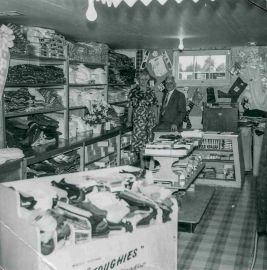
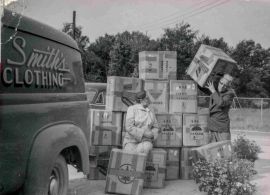
Dad retired in 1970 and, at that time, he was 73 years old. Dad always enjoyed being a salesman and was highly regarded by his customers for his fair and honest business practices.
Even in his retirement he would still visit some of his favourite customers with a suitcase filled with towels etc., and, over a cup of coffee, would make yet another sale..
Dad imported most of the articles himself, mostly from Holland. Later his suppliers were also Canadian manufacturers. He also sold some of his imported goods wholesale.
--------------------------------------------------------------
K.P.'s speech at a Smit family gathering
(The date is August 10, 1973. What follows are excerpts of a humorous speech Opa Smit spoke to his siblings gathered in northern Groningen at a reunion. It was translated by Corrie`s sister, Annie, who died in March, 2020, in Sarnia, Ontario.)
It is a great privilege to be together, once more, as brothers and sisters. It really is a great occasion that all seven children of one family can get together, all of us being in their seventies and eighties.
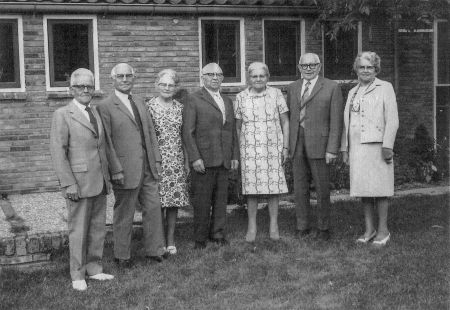
K.P and all his siblings at a gathering somewhere in North Groningen
Some highlights of what some say about us:
Tina is the oldest
Hendrik is the naughty one
Koene is the wildest
Kees is the quiet one
Roelof is the broekeman (little one)
Foske doesn't yet know anything
Grietje did not yet have a name (not born yet)
Naturally this speech is mostly about myself and my own experiences in the family. Early in my life I already had company, for my brother (Koene) and I were twins. They called us Esau and Jacob. Koene was always first. Early in my life I was pushed out of the nest.
I was 14 years old when my father and I went to a clothing store in Groningen city, for they thought I would be a good merchant. But my parents had to pay 40 guilders a year for me to learn the trade and that was too heavy a financial load for them. So I started working for a grocer, Doornbos by name, in Grootegast. I was able to earn a living and received 50 cents a week from my mother to whom I turned over my wages. The 50 cents, later, later became 75 cents! Every week I had to show how and where I had spent my money. Once I bought a chocolate bar. But that could not happen too often.
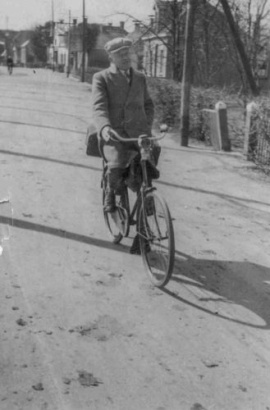
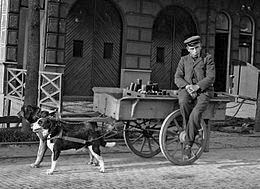
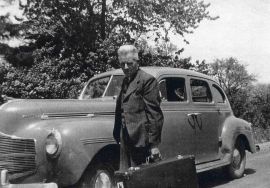
I started with making grocery deliveries on a bike to the customers. Later it became a little easier for me when I started delivering groceries with a dog cart. I am the only one in our family who had a dog cart and now, 60 years later, I am the only one with a car! Some improvement, eh?
I came home to my own family every Saturday night and had to go back on Sunday evenings - a very difficult time for me. Mostly we would sing psalms and hymns around the organ at night - Psalm 84 was our favourite psalm - and then I had to leave, sometimes with tears in my eyes. Nobody paid attention to that except my mother.
Koene had to study to become a teacher. Every day he went on his bike to Groningen. He had wooden squares on his pedals so he could reach them. I once saved Koene's life when he went through the ice. He was up to his neck in the water and I pulled him out, chilled to the bone. Never a "thank you" did I get for it.
In closing
K.P. and Afina Broekema were married on July 30, 1931. By this time, K.P. had taken over an existing textile and clothing store on the main street of Surhuisterveen, Friesland.
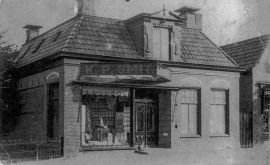
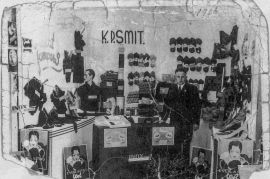
While Afina looked mainly after the store, K.P. began building up his clientele by visiting many people in the area using his bike, carrying a large suitcase with samples of the store`s contents.
The so-called Great Depression in the Netherlands occurred between 1933 and 1936. It was a period of severe economic crisis, which affected countries around the world, including Holland.
There is no doubt that the newly-weds went through a tough time in the early 1930s. Yet, between 1931 and 1936 four children were born: Henk, Gretha, Annie and Cornelia.
They left for Canada in 1951 after weathering tumultuous times in the world prior to, during and after World War II.
[an error occurred while processing this directive]